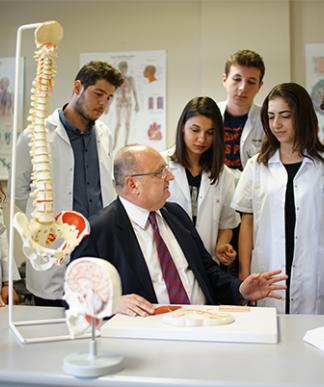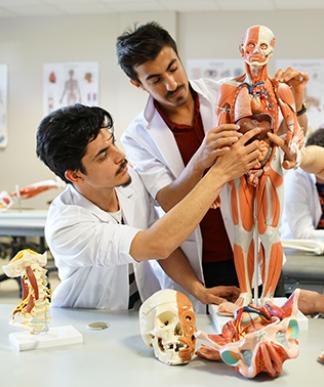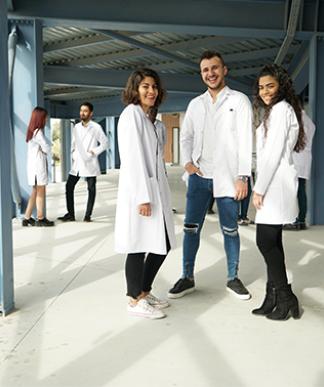


About the Program
The School of Health Sciences Child Development program; started providing education at the undergraduate level during the 2017-2018 academic year.
The purpose of the Child Development program is to produce child developers to serve the family and educators of children, and the society they reside within; of children who are normally developing, disabled, in need of protection, working, are refugees, forced to commit crimes, and hospitalized children, between the ages of 0-18, with the ability to evaluate their cognitive, language, motor, social, emotional development and self-care skills, while supporting all their development and skill areas. Students who graduate from this program work with the title of "Child Development Specialist".
Child developers, who have important duties such as revealing the development of children in different fields, supporting them when needed, guiding families and educators on this subject, providing the necessary guidance to form appropriate educational programs and raising public awareness; play an important role in a modern and conscious society composed of healthy and successful individuals in every aspect. In today's world, despite the technological developments, the increase in social problems and the need for families that form the basis of society to be able to raise healthier children, reveal the importance of the field of child development.
Career Areas
Child Development program students graduate with a working formation to provide consultancy and cooperation to organizations and establishments, providing a service to families in the area of child development, establish coordination with disciplines related to children and families, and raise the awareness of the society on issues such as determining the development levels of children in all developmental areas, preparing programs and environmental organizations suitable for their developmental levels, following the development of the child in different areas, making new arrangements accordingly and preparing educational programs.
Child development professionals can find jobs across the wide-ranging fields of health, social and other sectors. Child development professionals and child development specialists working in hospitals and Family Health Centers, are responsible for making evaluations regarding the development of child development services provided in primary health care institutions, producing and implementing plans, programs and projects, and working in cooperation with the relevant individual and branch, in order to create internal and external cooperation opportunities.
Contact
School of Health Sciences
Çevik Uraz Center, CU206
Tel: +90 392 671 1111 Extension: 2251
School E-mail: secretary-vhs@ciu.edu.tr
Director E-mail: aarkut@ciu.edu.tr
Compulsory Courses
First Semester
BASIC COMPUTING
Course code
BILT110Credit
3Theoretical
2Practical
2Ects
4HUMAN BIOLOGY
Course code
BIYO105Credit
2Theoretical
2Practical
0Ects
4CHILD DEVELOPMENT-I
Course code
CKGL101Credit
3Theoretical
3Practical
0Ects
4ELEMENTARY ENGLISH-I
Course code
INGL123Credit
3Theoretical
3Practical
0Ects
4INTRODUCTION TO PRE- SCHOOL EDUCATION
Course code
OOEG101Credit
3Theoretical
3Practical
0Ects
5INTRODUCTION TO PSYCHOLOGY
Course code
PSKO103Credit
3Theoretical
3Practical
0Ects
4SOCIOLOGY
Course code
SOSY101Credit
3Theoretical
3Practical
0Ects
5TURKISH LANGUAGE
Course code
TREG100Credit
0Theoretical
2Practical
0Ects
2Second Semester
ANATOMY
Course code
ANAT201Credit
4Theoretical
3Practical
2Ects
6GENERAL NUTRITION
Course code
BESD200Credit
2Theoretical
2Practical
0Ects
3CHILD DEVELOPMENT-II
Course code
CKGL102Credit
3Theoretical
3Practical
0Ects
4PHYSIOLOGY
Course code
FIZY201Credit
3Theoretical
3Practical
0Ects
4ELEMENTARY ENGLISH-II
Course code
INGL124Credit
3Theoretical
3Practical
0Ects
4COMMUNICATION IN HEALTH
Course code
SGBL260Credit
2Theoretical
2Practical
0Ects
3MODERN TURKISH HISTORY
Course code
TARH100Credit
0Theoretical
2Practical
0Ects
2UNIVERSITY ELECTIVE
Course code
UNISXX1Credit
3Theoretical
3Practical
0Ects
3Third Semester
SUMMER INTERSHIP
Course code
CKGL200Credit
0Theoretical
0Practical
0Ects
0CHILD HEALTH AND DISEASE
Course code
CKGL203Credit
3Theoretical
3Practical
0Ects
4FAMILY EDUCATION
Course code
CKGL209Credit
3Theoretical
3Practical
0Ects
3EARLY CHILDHOOD EDUCATION PROGRAMS
Course code
OOEG257Credit
3Theoretical
3Practical
0Ects
5COMMUNICATION WITH CHILDEREN
Course code
OOEG413Credit
2Theoretical
2Practical
0Ects
3SPECIAL EDUCATION
Course code
OZEG219Credit
3Theoretical
3Practical
0Ects
4CHILD PSYCHOLOGY AND MENTAL HEALTH
Course code
PSKO209Credit
3Theoretical
3Practical
0Ects
4SOCIAL ANTHROPOLOGY
Course code
SOSY104Credit
2Theoretical
2Practical
0Ects
4Fourth Semester
DEVELOPMENT AND EDUCATION IN MIDDLE CHILDHOOD
Course code
CKGL202Credit
3Theoretical
3Practical
0Ects
8CHILD AND DRAMA
Course code
CKGL208Credit
3Theoretical
2Practical
2Ects
5DEVELOPING TOOLS AND MATERIALS IN EDUCATION
Course code
CKGL210Credit
3Theoretical
2Practical
2Ects
6SCIENCE AND TECHNOLOGY IN CHILDREN
Course code
CKGL212Credit
3Theoretical
2Practical
2Ects
4ALAN SEÇMELI
Course code
CKGLXX1Credit
2Theoretical
2Practical
0Ects
2UNIVERSITY ELECTIVE
Course code
UNISXX2Credit
3Theoretical
3Practical
0Ects
4Fifth Semester
EARLY INTERVENTION APPROACHES AND DEVELOPMENTAL RISKS
Course code
CKGL301Credit
3Theoretical
3Practical
0Ects
6ART AND CREATIVITY IN CHILD
Course code
CKGL303Credit
3Theoretical
3Practical
0Ects
6CHILD IN HOSPITAL AND HEALTH INSTITUTIONS
Course code
CKGL305Credit
3Theoretical
3Practical
0Ects
6DEVELOPMENT AT ADOLESCENCE PERIOD
Course code
CKGL309Credit
3Theoretical
3Practical
0Ects
6INCLUSION
Course code
OZEG320Credit
2Theoretical
2Practical
0Ects
3RESEARCH METHODS IN HEALTH SCIENCES
Course code
SGBL300Credit
2Theoretical
2Practical
0Ects
3Sixth Semester
MOTHER AND CHILD NUTRITION
Course code
BESD320Credit
3Theoretical
3Practical
0Ects
4DEVELOPMENTAL DIAGNOSIS AND EVALUATION TECHNIQUES
Course code
CKGL304Credit
2Theoretical
2Practical
0Ects
4INFANCY AND EARLY CHILDHOOD PRACTICES
Course code
CKGL308Credit
3Theoretical
0Practical
6Ects
8AREA ELECTIVE
Course code
CKGLXX2Credit
2Theoretical
2Practical
0Ects
3INDIVIDUALIZED TRAINING PROGRAMS
Course code
EGIT366Credit
2Theoretical
2Practical
0Ects
3FIRST AID
Course code
IAYM220Credit
2Theoretical
2Practical
0Ects
4BIOSTATISTICS
Course code
ISTA110Credit
2Theoretical
2Practical
0Ects
3Seventh Semester
SUMMER INTERSHIP
Course code
CKGL400Credit
0Theoretical
0Practical
0Ects
6DISSERTATION I
Course code
CKGL401Credit
3Theoretical
1Practical
4Ects
4OCCUPATIONAL LEGISLATION
Course code
CKGL405Credit
2Theoretical
2Practical
0Ects
3PRACTICUM IN HEALTH CARE INSTITUTIONS
Course code
CKGL407Credit
4Theoretical
0Practical
8Ects
8AREA ELECTIVE
Course code
CKGLXX3Credit
2Theoretical
2Practical
0Ects
3EPIDEMIOLOGY
Course code
SGBL210Credit
3Theoretical
3Practical
0Ects
4COMMUNITY SERVICE PRACTICES
Course code
SOSH100Credit
2Theoretical
1Practical
2Ects
3Eighth Semester
DISSERTATION II
Course code
CKGL402Credit
3Theoretical
1Practical
4Ects
6SEMINAR
Course code
CKGL406Credit
2Theoretical
2Practical
0Ects
5TECHNIQUES OF CHILD RECOGNITION AND EVALUATION
Course code
CKGL408Credit
3Theoretical
2Practical
2Ects
4AREA ELECTIVE
Course code
CKGLXX4Credit
2Theoretical
2Practical
0Ects
3PRACTICUM IN SPECIAL EDUCATION
Course code
OZEG225Credit
4Theoretical
0Practical
8Ects
13Elective Courses
HEALTH ECONOMY
Course code
SAGY103Credit
3Theoretical
3Practical
0Ects
7CHILDREN AND MUSIC
Course code
CKGL315Credit
2Theoretical
2Practical
0Ects
3TR Applicants
TR Students who are successful in the exams conducted by the Higher Education Council Student Selection and Placement Center (ÖSYM) and are entitled to enroll in our university in line with their preferences can complete the registration process with the necessary documents for registration from our Registration and Liaison Offices throughout Turkey or from the Marketing Directorate on campus.
Click for detailed admission requirements information.
TRNC Applicants
TRNC citizens and TR citizen candidate students who have completed their entire high school education in TRNC. They are placed in undergraduate programs in line with their success in the CIU Student Placement and Scholarship Ranking Exam and the programs they prefer.
Students who are successful in the exam can register from the TRNC Marketing Office.
Tuition Fees are determined at the beginning of each academic year. Candidate students who are entitled to enroll in CIU can learn their fees in line with the Tuition Fee Calculation system.